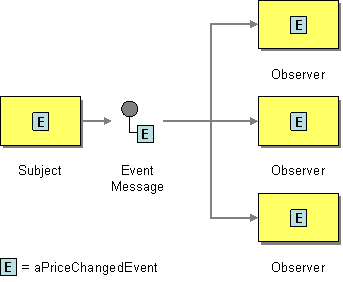Event Message
Camel supports the Event Message from the EIP patterns by supporting the Exchange Pattern on a Message which can be set to InOnly to indicate a oneway event message. Camel Components then implement this pattern using the underlying transport or protocols.

The default behaviour of many Components is InOnly such as for JMS, File or SEDA
| See the related Request Reply message. |
Explicitly specifying InOnly
If you are using a component which defaults to InOut you can override the Exchange Pattern for an endpoint using the pattern property.
foo:bar?exchangePattern=InOnlySamples
From 2.0 onwards on Camel you can specify the Exchange Pattern using the DSL.
from("mq:someQueue").
setExchangePattern(ExchangePattern.InOnly).
bean(Foo.class);or you can invoke an endpoint with an explicit pattern
from("mq:someQueue").
inOnly("mq:anotherQueue");And with XML:
<route>
<from uri="mq:someQueue"/>
<inOnly uri="bean:foo"/>
</route><route>
<from uri="mq:someQueue"/>
<inOnly uri="mq:anotherQueue"/>
</route>